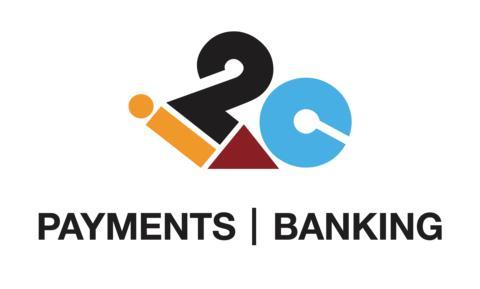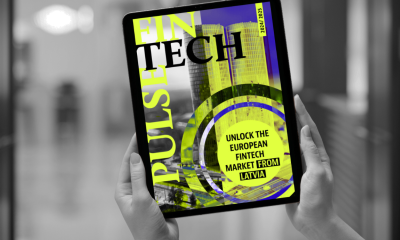Fintech
Euro Asia Pay Partners with i2c to Lay Foundations for U.S. Expansion

Vancouver, British Columbia–(Newsfile Corp. – January 11, 2022) – Euro Asia Pay Holdings Inc. (CSE: EAP) (“EAP” or the “Company“), a leading fintech solutions provider, is pleased to announce that the Company has partnered with i2c Inc., a leading digital payments and banking technology provider, to establish a footprint for Hero Financials in the United States. Hero Financials is EAP’s full-service alternative-to-banking solution that allows guardians to easily provide funds to their dependents while controlling and monitoring payments and promoting financial literacy for the next generation of consumers.
The Company’s proprietary suite of parental control features complements i2c’s highly customizable “plug-and-play” platform to offer modern payment solutions for individuals and families across the U.S. The product features a mobile application with a built-in budgeting tool, savings function, contactless payments, and security backed by third-party encryption. Transfers are sent in real-time, and funds can be used in-store or online, where users have access to contactless and chip payments.
“Hero Financials was created to support the next generation of consumers as they embark on their financial literacy journey,” commented Peter MacKay, CEO of EAP. “We chose i2c as our issuing-processing partner because of their global reach and reputation for highly reliable security features. Their willingness to think outside of the box is a perfect match to bring our vision to life. We look forward to bringing parents peace of mind with an intuitive, secure and modern payment product built with their needs in mind.”
“We are proud to partner with Euro Asia Pay as they empower the next generation to gain financial literacy, practice healthy spending habits, and develop lifelong personal finance skills-safely under the supervision of their guardians,” said Amir Wain, Founder and CEO of i2c. “We pride ourselves on working with leaders that are building the financial services experiences of tomorrow, and Hero is a perfect embodiment of how we can use technology to reimagine FinServ and invest in the financial wellness of tomorrow’s consumers.”
About Euro Asia Pay Holdings Inc.
Euro Asia Pay Holdings Inc. is a developer of innovative financial solutions for the next generation of consumers. Its first product, SideKick™, enables parents to transfer, control and monitor payments to their children in a simple, intuitive manner. The product includes a student-facing mobile application, a prepaid student payment card and a parent portal, among other features.
To learn more about EAP’s products and services, visit www.euroasiapay.com.
About i2c Inc.
i2c is a global provider of highly configurable payment and banking solutions. Using i2c’s proprietary “building block” technology, clients can easily create and manage a comprehensive set of solutions for credit, debit, prepaid, lending and more, quickly and cost-effectively. i2c delivers unparalleled flexibility, agility, security and reliability from a single global SaaS platform. Founded in 2001, and headquartered in Silicon Valley, i2c’s next-generation technology supports millions of users in more than 200 countries/ territories and across all time zones. For more information, visit www.i2cinc.com and follow the company at @i2cinc.
On Behalf of the Board of Directors
Peter MacKay
Chief Executive Officer & Director
For further information, please contact:
Peter MacKay
Chief Executive Officer & Director
(800) 508-8813
[email protected]
For all media queries, please contact:
Euro Asia Pay Holdings Inc.
Swati Mehta
PR Associates
(403) 804-0768
[email protected]
i2c Inc.
Heather Clifton
Chief Marketing Officer
[email protected]
Forward-Looking Statements
Certain statements in this news release include forward-looking statements or information (collectively “forward-looking statements“) within the meaning of applicable Canadian securities legislation. The Company is providing cautionary statements identifying important factors that could cause its actual results to differ materially from those projected in these forward-looking statements. Any statements that express, or involve discussions as to, expectations, beliefs, plans, objectives, assumptions or future events or performance (often, but not always, through the use of words or phrases such as “may”, “anticipates”, “is expected to”, “estimates”, “intends”, “plans”, “projection”, “could”, “vision”, “goals”, “objective” and “outlook”) are not historical facts and may be forward-looking. The Company has based the forward-looking statements largely on its current estimates, assumptions and projections about future events and trends that it believes may affect its business, financial condition and results of operations.
By their nature, forward-looking statements involve numerous assumptions, inherent risks and uncertainties, both general and specific, which contribute to the possibility that the predicted outcomes may not occur or may be delayed. The risks and uncertainties, many of which are beyond the Company’s control, include, but are not limited to: the ability of the Company to establish a market for its products; competitive conditions in the mobile payments industry which could prevent the Company from becoming profitable; the effectiveness and efficiency of advertising and promotional expenditures to generate interest in the Company’s products; dependency on continued growth in the adoption of mobile payment technology; volatility of the market price of the Company’s securities; the inability to secure additional financing; the Company’s intention not to pay dividends; claims, lawsuits and other legal proceedings and challenges; conflicts of interest with directors and management; and other relevant factors.
Factors that could cause the Company’s actual results to differ from the forward-looking statements include its history of losses from operations; technology risks; its ability to obtain the additional financing required to meet long-term goals; its dependence on key personnel, including its executive officers; and uninsured risks. These factors are not exhaustive.
Further, any forward-looking statement speaks only as of the date on which such statement is made, and, except as required by applicable law, the Company undertakes no obligation to update any forward-looking statement to reflect events or circumstances after the date on which such statement is made or to reflect the occurrence of unanticipated events. New factors emerge from time to time, and it is not possible for management to predict all such factors and to assess in advance the impact of each such factor on the Company’s business or the extent to which any factor, or combination of factors, may cause actual results to differ materially from those contained in any forward-looking statement.
Fintech
Banking and Capital Markets: Navigating a Complex Future

Curated in collaboration with the London School of Economics and Political Science (LSE)
The global financial industry stands at a pivotal juncture, facing a rapidly evolving landscape shaped by technological disruption, sustainability mandates, and geopolitical uncertainties. The end of prolonged accommodative monetary policies has ushered in an era of increased scrutiny, regulatory tightening, and heightened demand for innovation. At the same time, financial technology (fintech) continues to transform the sector, driving new opportunities and challenges for traditional banking systems.
This article delves into the strategic issues currently defining Banking and Capital Markets. Drawing from expert insights curated by Lutfey Siddiqi, Visiting Professor-in-Practice at LSE, it examines the dynamic risk environment, emerging technology trends, shifts in banking business models, and the growing focus on sustainability and talent development.
Key Issues Influencing Banking and Capital Markets
- The Financial Risk Landscape: Heightened geopolitical tensions and regulatory demands are reshaping the industry.
- Financial Technology: Emerging technologies such as artificial intelligence (AI) and blockchain offer potential but also pose significant implementation challenges.
- Banking Business Models: Institutions are adopting diverse strategies to navigate competition and shifting market demands.
- Financial Talent: Attracting the next generation of banking professionals requires a clear purpose and forward-thinking policies.
- Sustainability and Finance: Balancing environmental and social goals with immediate business priorities is a growing challenge.
1. Latest Insights: Shifting the Banking Paradigm
Experts highlight the profound challenges and opportunities facing financial institutions today. From geopolitical volatility to advances in fintech, the banking landscape demands unprecedented agility. Recent developments include:
- Monetary Policy Adjustments: China’s central bank explores easing policies to boost investment.
- Regulatory Scrutiny: Global banking rules, such as Basel 3.1 reforms, are under review, signaling potential shifts in global supervision.
- Financial Inclusion: Updates from the Financial Action Task Force (FATF) aim to balance anti-money laundering standards with broader access to financial services.
These trends emphasize the need for financial institutions to anticipate disruptions while fostering resilience and innovation.
2. Strategic Context: Transforming Banking in a High-Stakes Era
2.1 The Financial Risk Landscape
Banks are grappling with an increasingly volatile environment characterized by geopolitical tensions, regulatory reforms, and market disruptions. The end of ultra-loose monetary policies has highlighted weaknesses in traditional funding models, exemplified by the high-profile collapses of Silicon Valley Bank and Credit Suisse in 2023.
Regulators are tightening oversight, expanding their focus to include non-bank institutions and fintech companies. Additionally, rising geopolitical tensions demand localized data operations, robust cybersecurity measures, and new approaches to global strategy.
Key takeaway: In an age of uncertainty, resilience and stability are essential.
2.2 Financial Technology
The Fourth Industrial Revolution continues to reshape banking through advancements like AI, blockchain, and quantum computing. However, challenges remain, such as limited real-world blockchain applications and increasing cybersecurity risks tied to digitalization.
Financial institutions must adopt technology thoughtfully, focusing on solutions that address specific operational pain points and align with organizational goals. Balancing efficiency with contingency planning for outages and cyber threats is paramount.
Key takeaway: Tech adoption must prioritize practicality, security, and alignment with purpose.
2.3 Banking Business Models
Global trends are driving a diversification of banking models. Some institutions are scaling back operations in unprofitable markets, while others are leveraging acquisitions or digital innovation to expand. The rise of big tech competitors—armed with vast behavioral data—adds a new layer of complexity to the competitive landscape.
Emerging trends include:
- Consolidation of corporate and private banking services.
- Strategic retreats from costly markets, such as HSBC’s exit from US retail banking.
- Big tech firms offering financial services as data-driven loss leaders.
Key takeaway: Differentiation and adaptability are critical in a fragmented, competitive market.
2.4 Financial Talent
The banking sector faces a mounting talent crisis, particularly among younger generations who view the industry as outdated or misaligned with their values. To attract top talent, banks must redefine their purpose and emphasize their commitment to sustainability, innovation, and career growth opportunities.
Surveys indicate that young professionals seek workplaces offering training, flexibility, and inclusive leadership. Reskilling initiatives and a focus on digital expertise will also be key to preparing employees for the future.
Key takeaway: A compelling vision for the future of banking is essential to attract and retain top talent.
2.5 Sustainability and Finance
Sustainability has become a focal point for the financial industry, driven by growing demand for ESG (Environmental, Social, and Governance) initiatives. However, backlash against greenwashing and tokenism has led banks to reevaluate their approaches.
Balancing short-term priorities like energy security with long-term goals like combating climate change requires bold leadership. Opportunities abound in areas such as carbon trading, green bonds, and sustainability-linked investment products. However, success demands authenticity and a commitment to systemic change.
Key takeaway: Embedding sustainability into core operations is vital for long-term success.
Transformation Maps: A Strategic Tool for Leaders
This analysis leverages the World Economic Forum’s Strategic Intelligence Transformation Maps, which provide an interconnected view of global trends and challenges. These tools enable leaders to explore key topics, such as cybersecurity, fintech, and sustainability, and understand how they shape the future of Banking and Capital Markets.
Conclusion
The financial industry’s journey through this transformative era requires agility, innovation, and a deep commitment to purpose. From adapting to geopolitical tensions to embracing sustainability and nurturing top talent, financial institutions must strike a delicate balance between tradition and progress.
By leveraging technology, redefining business models, and embedding ESG principles into their strategies, the sector can navigate today’s challenges and build a resilient, forward-thinking future.
For more insights and resources, visit the World Economic Forum’s Strategic Intelligence platform.
The post Banking and Capital Markets: Navigating a Complex Future appeared first on News, Events, Advertising Options.
Fintech
Former MD of SUI Foundation, Greg Siourounis, Joins xMoney Global as Co-Founder and CEO to build MiCA-Regulated Stablecoin Platform

xMoney Global, the global, inter-bank and cross crypto/fiat integrated payments platform has appointed award-winning economist Dr. Greg Siourounis as Co-Founder and CEO. The company is a Mastercard principal member, with strategic European licenses, such as e-Money and VASP.
As the digital landscape continues to evolve with the coming MiCA regulation, xMoney Global intends to lead Europe into this new transformative EU regulated stablecoin era. Greg Siourounis will lead the integration of xMoney’s advanced blockchain-enabled payments infrastructure with its upcoming stablecoin program. Stablecoins are a key driver of blockchain adoption in today’s market, now surpassing Bitcoin, remittances, and PayPal in annual transaction volume. As such, xMoney’s Global reputation positions it to bridge Web3 innovation with traditional finance, leading Europe into a new transformative EU regulated stablecoin era.
Dr. Greg, who has played a pioneering role in the growth of Sui Foundation as its former Managing Director and who previously founded Everypay, will drive xMoney Global’s next wave of growth. Beyond the standard reference of his academic work in 2024’s Nobel Prize in Economics, Dr. Greg’s career is also decorated with awards such as the 2005 Young Economist Award from The European Economic Association and the 2008 Austin Robinson Prize from The Royal Economic Society. His immediate target will be to focus on partnerships, regulatory alignment and market expansion, as xMoney Global looks to build a comprehensive payments platform that bridges legacy financial systems with the potential of decentralized finance.
Commenting on his appointment, Dr. Greg Siourounis, CEO of xMoney Global, said, “As Europe prepares to embrace MiCA regulation, xMoney Global is positioned to redefine what compliant, secure, and seamless digital payments can be. Our goal is to deliver a solid and trusted ecosystem that combines the strengths of traditional finance with the flexibility of blockchain technology to create a future-ready payment experience.”
Beniamin Mincu, Co-founder of MultiversX, said, “xMoney Global’s mission aligns perfectly with the vision of MultiversX to bring scalable and secure blockchain solutions to mainstream finance. This appointment marks a significant step toward building a more inclusive and resilient financial system.”
The launch of xMoney Global aims to offer a next-gen blockchain-as-a-service module backed by its native stablecoin, with key white-labeled services including acquiring, issuing, onramps/offramps and a sticky loyalty program, all backed by MultiversX’s state-of-the-art sharding technology. Following the surge in crypto markets after Trump’s pro-crypto Presidential win, xMoney will be ideally placed to accelerate real-world adoption as the easiest way for everyone (consumers, retail and e-commerce) to seamlessly access fiat and crypto currencies in an app, card or payment gateway.
The post Former MD of SUI Foundation, Greg Siourounis, Joins xMoney Global as Co-Founder and CEO to build MiCA-Regulated Stablecoin Platform appeared first on News, Events, Advertising Options.
Fintech
Fintech Pulse: A Daily Dive into Industry Innovations and Developments

The financial technology sector continues to evolve at a rapid pace, offering innovations that disrupt traditional paradigms. Today’s briefing underscores fintech’s diverse growth avenues: from substantial venture capital plays and strategic partnerships to groundbreaking implementations in lending. Here’s a closer look at recent developments shaping the landscape.
Synapse’s Comeback and Andreessen Horowitz’s Strategic Bet
Source: Axios
Synapse, a financial infrastructure company previously embattled by controversy, is staging a remarkable comeback, backed by none other than venture capital heavyweight Andreessen Horowitz (a16z). With this new infusion of funds, Synapse aims to consolidate its position as a premier platform for building financial services tools.
This resurgence demonstrates the resilience of the fintech ecosystem, where innovation often prevails over turbulence. Synapse’s renewed vigor also signals that top-tier investors remain bullish on infrastructural solutions pivotal to the future of digital finance. Andreessen Horowitz’s participation not only validates Synapse’s model but also underscores the VC giant’s enduring interest in fintech infrastructure, even amid global economic uncertainties.
Analysis:
This partnership exemplifies the dynamism within fintech, highlighting the interplay of innovation, capital, and resilience. It also raises questions about the broader implications of giving second chances to firms with turbulent histories. While Synapse’s evolution could inspire others, it also places a spotlight on governance and accountability in high-growth sectors.
Israel’s Fintech Scene Gets a Boost with Investment in Finova Capital
Source: Calcalistech
Israeli fintech startup Finova Capital has raised an impressive $20 million in a funding round led by prominent institutional investors. This marks a significant milestone for the company as it seeks to expand its suite of financial solutions aimed at underserved markets.
Israel’s fintech ecosystem has long been recognized as a hub of innovation, and this latest investment only reinforces its global standing. Finova Capital’s focus on empowering smaller businesses and fostering financial inclusivity aligns with emerging trends where tech-driven solutions bridge critical gaps in financial services.
Analysis:
With this funding, Finova is poised to enhance its technological offerings while contributing to economic inclusion. However, the broader fintech industry will watch closely to see how the company leverages this capital amid increasing competition from regional and global players.
India’s Yubi Plans a Fundraising Push
Source: Bloomberg
Yubi, a prominent Indian fintech platform backed by Insight Partners, is reportedly preparing for a new fundraising round. Having already established itself as a leader in credit infrastructure, Yubi aims to bolster its offerings and expand its market footprint.
India’s fintech landscape is witnessing explosive growth, with platforms like Yubi playing a critical role in the credit ecosystem. Yubi’s planned fundraising reflects the broader appetite for scaling solutions that streamline credit access, particularly in emerging markets where traditional lending models often fall short.
Analysis:
This development highlights two key trends: the increasing reliance on credit platforms in high-growth economies and the strategic role of international investors like Insight Partners in driving fintech innovation. Yubi’s expansion plans could set a precedent for other regional fintech players seeking to scale amid global economic headwinds.
Provenir and Hastings Financial Services Win Global Recognition
Source: Business Wire
In a testament to the transformative power of digital lending solutions, Provenir and Hastings Financial Services have been jointly recognized for the Best Digital Lending Implementation at the IBSi Global Fintech Innovation Awards. This accolade underscores the success of their collaboration in modernizing the lending process through cutting-edge technology.
Provenir’s advanced decision-making platform and Hastings Financial Services’ lending expertise have delivered a solution that significantly enhances user experience, operational efficiency, and risk management. Such innovations highlight the increasing role of partnerships in advancing fintech’s digital transformation.
Analysis:
This recognition not only validates the efficacy of digital lending but also emphasizes the importance of partnerships in driving innovation. It signals to the industry that collaboration can be a powerful tool for staying ahead in a rapidly evolving marketplace.
Microf and Quantum Financial Technologies Forge New Alliances
Source: PR Newswire
Microf, a financial solutions provider, has announced a strategic partnership with Quantum Financial Technologies. This collaboration aims to expand lending solutions for contractors, providing streamlined access to capital for businesses in need of flexible financing options.
This partnership is a timely response to the growing demand for specialized financial products in niche markets. By leveraging Quantum’s technology, Microf can now offer more tailored solutions, particularly to contractors navigating complex financial requirements.
Analysis:
This development reflects a growing trend: the diversification of fintech offerings to serve specific market segments. As competition in mainstream fintech intensifies, targeting underserved niches could become a defining strategy for success.
Key Takeaways for the Fintech Ecosystem
- Resilience in Fintech Funding: Despite economic uncertainties, venture capital continues to fuel innovative fintech players like Synapse and Finova Capital.
- Regional Growth Stories: From Israel to India, fintech ecosystems are thriving, attracting global attention and investment.
- Collaboration as a Catalyst: The success of partnerships like Provenir-Hastings and Microf-Quantum underscores the importance of strategic alliances.
- The Power of Recognition: Awards like the IBSi Fintech Innovation Awards validate industry achievements, inspiring others to push the envelope.
- Focus on Inclusion: Whether through credit platforms or lending solutions, fintech is playing a pivotal role in fostering financial inclusivity worldwide.
Looking Ahead: Challenges and Opportunities
The fintech sector’s journey is far from linear. Regulatory complexities, technological disruptions, and market volatility remain persistent challenges. However, as seen in today’s developments, the opportunities far outweigh the risks. By prioritizing innovation, collaboration, and inclusivity, fintech players can navigate the complexities of the global financial landscape.
This moment in fintech history is pivotal. It’s a time for bold decisions, strategic partnerships, and a commitment to bridging financial divides. As industry players rise to the occasion, the road ahead promises a future where technology and finance intertwine to empower individuals and businesses alike.
The post Fintech Pulse: A Daily Dive into Industry Innovations and Developments appeared first on News, Events, Advertising Options.
-

 Fintech3 days ago
Fintech3 days agoFintech Pulse: A Daily Dive into Industry Innovations and Developments
-

 Fintech3 days ago
Fintech3 days agoFormer MD of SUI Foundation, Greg Siourounis, Joins xMoney Global as Co-Founder and CEO to build MiCA-Regulated Stablecoin Platform
-

 Fintech5 days ago
Fintech5 days agoFintech Latvia Association Releases Fintech Pulse 2024: A Guide to Latvia’s Growing Fintech Hub
-

 Fintech5 days ago
Fintech5 days agoQuantum Security and the Financial Sector: Paving the Way for a Resilient Future
-

 Fintech PR7 days ago
Fintech PR7 days agoChina’s AIMA brand electric motorbike is now in Bangladesh
-

 Fintech PR2 days ago
Fintech PR2 days agoYunoJuno Recognised as Best International Contractor Provider, Revolutionising Global Freelance Management
-

 Fintech PR7 days ago
Fintech PR7 days agoChina Telecom Gulf Officially Launches in Saudi Arabia for Business
-

 Fintech PR3 days ago
Fintech PR3 days agoLONGi and IUCN jointly release the Initiative of Advancing Climate Action and Biodiversity Conservation with Photovoltaic








